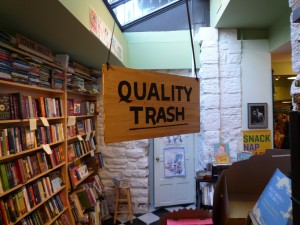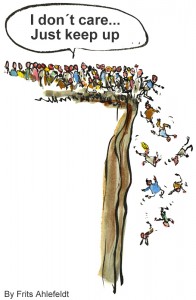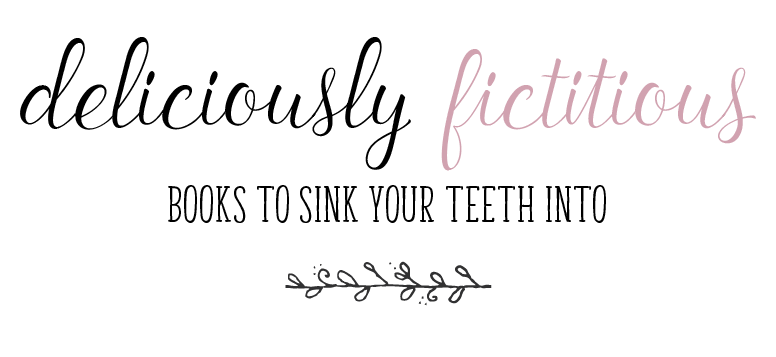
Image (c) Krista Kennedy via Flickr.com.
Booker Prize chair Peter Stothard’s fears for literature’s longevity aren’t about bloggers at all. They’re about reading tastes, and to a lesser extent, the newspaper industry.
Stothard’s comments this week in the Guardian and The Independent that blogging is drowning out “serious” literary criticism and harming literature, are disturbing.
They also fail to recognise that book bloggers are doing the opposite. We’re helping to keep literary criticism alive. We’re engaging with “real” literary critics, reacting, commenting. We’re buying and reading books. But most of all – we’re keeping the conversation about books going.
In The Independent Stothard says among other things:
“There is a widespread sense in the UK, as well as America, that traditional, confident criticism, based on argument and telling people whether the book is any good, is in decline. Quite unnecessarily.”
and,
“Eventually that [the rise of blogging] will be to the detriment of literature. It will be bad for readers; as much as one would like to think that many bloggers’ opinions are as good as others, it just ain’t so. People will be encouraged to buy and read books that are no good, the good will be overwhelmed, and we’ll be worse off. There are some important issues here.”*
I’m sorry, but these arguments are utterly flawed. Let me present a (hopefully) reasoned case as to why.
We are all individuals
First, they assume that bloggers can all be lumped into one homogeonous category. And this, a category of ill-qualified people presenting unreasoned opinions.
This is like saying all journalists are of the same quality. Or all (traditional) news outlets. It’s nonsense. Some publications are known and revered over others for quality coverage, the training and expertise of their journalists and their approach to the editorial process. Some journos are known and revered over others for attention to detail, research and accuracy.
So it is with bloggers. We come from all walks of life. Some, like Stothard himself (he has been blogging here since 2005), have a background in literary criticism. Some are trained journalists. Some have degrees in literature or creative writing. Some live and breathe the book industry every day as publishers, editors, agents, authors, booksellers. Some just read their little butts off.
The quality of these people’s views reflect a great many things. Their backgrounds, yes, and their formal qualifications. How widely-read they are. But also personal traits, like how well they can argue a point, and how clearly they can express their opinion. Practice and training help with these things of course, but these are qualities that come more easily to some than to others.

Image (c) Frits Ahlefeldt-Laurvig via Flickr.com.
Readers are not lemmings
Stothard also assumes all readers are mindless sheep who will be hoodwinked by a subjective positive review and go out and buy that book over something more literarily “worthy”.
This is both giving the reader too much censure and too much praise.
Too much censure, because readers are not gormless puppets. If the proliferation of blogger reviews has done anything it’s give more power to the reader to enable us to pare down our massive ‘To Be Read’ lists. Where once we were forced to rely only on best friend Sal’s opinion, the guy in the paper or the gal at the bookstore, now we can look at all those and if we’re still not sure, we can Google it and read another half dozen opinions.
And by the way Sir Stothard, unreasoned reviews – particularly by those we don’t know, whose opinions we have no reason to trust – are unpersuasive. So yes, there may be bloggers out there giving those, but discerning book selectors are unlikley to waste their time on them.
For the less discerning, well they’re probably not reading the books pages of the paper anyway. So what readership have you really lost?
Trash has existed since time immemorial
Stothard’s claim that blogger reviews will make people buy trash over treasure is also giving readers too much credit. The trashily-inclined don’t need bloggers to tell them to read trash. Some readers will pick it up over a “worthier tome” every time. Reasoned literary critiques won’t change that. They may even serve to steer those readers further away.
There are some people who hear the word “classic” and run a mile, just as there are others who will fight their way over mountains of so-called lesser fiction to fish it out of the Cave of Wonders.

Image (c) Thalita Carvalho via Flickr.com.
There’s also the vexed question of what exactly “trash” IS. This is by no means as black and white as Stothard makes out. Austen was considered popular fiction in her day. She wrote about everyday people and everyday things. Now her books are classics. Shakespeare is the ‘classic-est’ of classics; yet he appealed to the groundlings as much as he did the nobles.
And let’s not forget that the novel itself as a genre was once looked upon as an inferior creature to ‘real literature’ (epic poetry and such). In 1811 poet Samuel Taylor Coleridge said: “Where the reading of novels prevails as a habit, it occasions in time the entire destruction of the powers of the mind.”
Amazing how perspectives change.
This isn’t about bloggers, it’s about readers
But the biggest flaw in Stothard’s argument is that he lays the ‘blame’ (I’m not sure that’s the right word) for any “overwhelming” of good books by bad, on bloggers, when this isn’t about bloggers at all.
Bloggers aren’t just book reviewers. They’re readers. Engaged, prolific ones. If the majority of them are praising “bad books” (and I’m not convinced they are), that’s not a statement about bloggers. It’s a statement about reading tastes. And if it is true, perhaps it should be a red flag, not a cause for derision.
In 2011, “readability” was a key factor in the Booker Prize award process. It caused a ruckus because Booker Prize chair Stella Rimington dared to say they were looking for books people would actually read.
This year, Stothard told The Independent readability was a “side issue”. He told the Guardian, “If we make the main criteria good page-turning stories – if we prioritise unargued opinion over criticism – then I think literature will be harmed.”
I don’t think Rimington ever suggested contribution to the English language should be sidelined by a good cliffhanger, but leaving that aside – if so many bloggers are in fact recommending “bad” books over “good” ones, perhaps it’s because the so-called good ones aren’t paying enough attention to readability.
Readability is not a side issue. It’s a central one. I have loved many books where (to use Jeanette Winterson’s definition of literature), I’ve answered ‘yes’ to the question: “Does this writer’s capacity for language expand my capacity to think and to feel?” But only the ones I’ve also found readable. The ones I’ve put down, or forced myself to plough through because I don’t like leaving a book unfinished, haven’t extended diddly squat – because I stopped listening.
Stothard says great works of art “renew the language in which they’re written”. I say a book can renew that language till the cows come home, but what kind of a renewal is it if no-one ever reads it? No-one will ever gain any benefit from it, and my fear is that if anything’s going to damage literature it’s this. Literature will sink under the weight of its own worthiness if “real” literary critics insist on ignoring the need for books to communicate.
We should be striving in fiction – as in blogs – for works that are both readable AND worthy.
Slimming down the ‘book’ pages
I also think it’s overly simplistic to say, as Stothard does, that the reason newspapers are giving less space to books in their print editions is because bloggers are already covering it online. I have worked as a journalist for a major newspaper and, if anything, bloggers are an incentive to traditional media outlets to differentiate their product by covering things better or differently.
If literary critics are doing this, they’ve got nothing to worry about. They’ll coexist happily with bloggers. (In fact, bloggers probably make up the majority of their readers, so perhaps discourgaing people who fuel book discussion online from doing so is not in paid critics’ interests.)
If literary critics are not doing things better or differently from bloggers, they need to, or yes, they will probably eventually be replaced by the free version. But that again is not a slight on the bloggers. Nor does it signal the demise of literary criticism. It will still be alive and well in the blogosphere.
Further, the space allotted to sections in the paper is to a large degree shaped by the advertising. The more ads that are booked, the more space for editorial content or, as they say, “the bigger the book”. Why? Paper and printing presses cost money and if certain pages aren’t generating any revenue, well, you do the maths.
Fortunately, this doesn’t have to spell the end of literary criticism either. News outlets have their own online world. Less space in the paper doesn’t mean there can’t be plenty of “proper” literary criticism on the website. Then it comes down to how many critics news outlets want to/can afford to employ. As for quality of reviews – yes, a story getting squeezed in print is a perennial problem. But there’s nothing to stop papers publishing a longer version online.
If paid critics feel their reviews are suffering due to lack of space, maybe this is an option they need to raise with their editors.
Mutual respect
As Stothard concedes, it’s great that there is a thriving community of people out there who care enough about books to keep the conversation going. This is what people used to do by word of mouth before television. And in the face of television, computer games and the spare-time-vortex that is Facebook, books need that conversation more than ever.
We need to foster the conversation in all its forms. By all means encourage better practices, but don’t just assume ‘newspaper good, blog bad’. (It’s a little Animal Farm.)
Most of all we need to recognise that if the weight of public opinion is against “worthy” books (and again, I’m not convinced it is), this might mean that rather than telling people off for praising the trash, we need to do something to get more people reading the treasure.
~ DF
* I’ve edited the punctuation of the original quote slightly, as there was a stray full stop and a missing apostrophe. This does not alter the sense of the quote.
